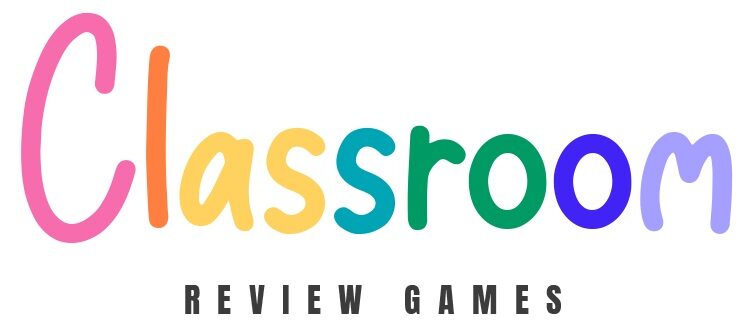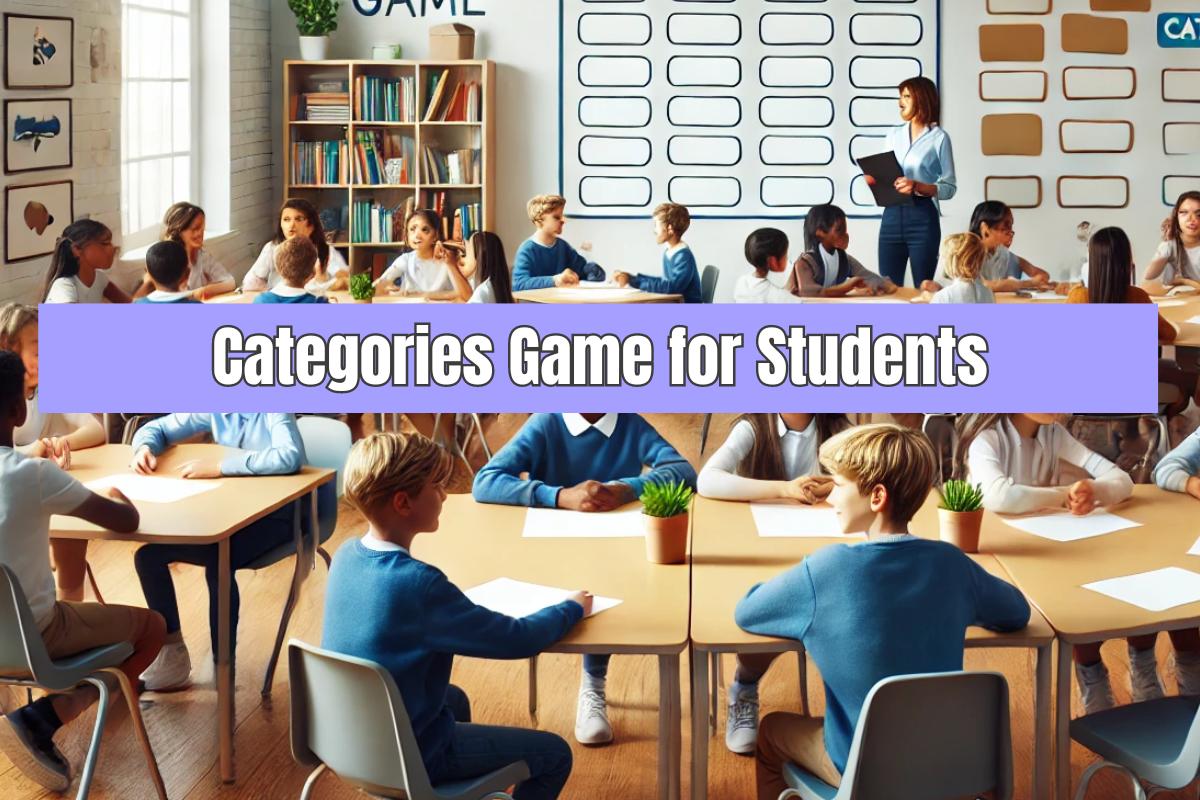Categories Game for Students
I love playing the categories game with my students because this word game really gets everyone thinking. The category game is perfect for any classroom setting and online lessons.
In this post, I’ll show you exactly how to play the categories game with your students and share a big list of categories for your next category game.
How to Play the Categories Game with Students
The Categories Game can be adapted to different classroom needs, levels, and subjects.
Categories Game Sheet
Download the free categories game sheet (one sheet for each group)
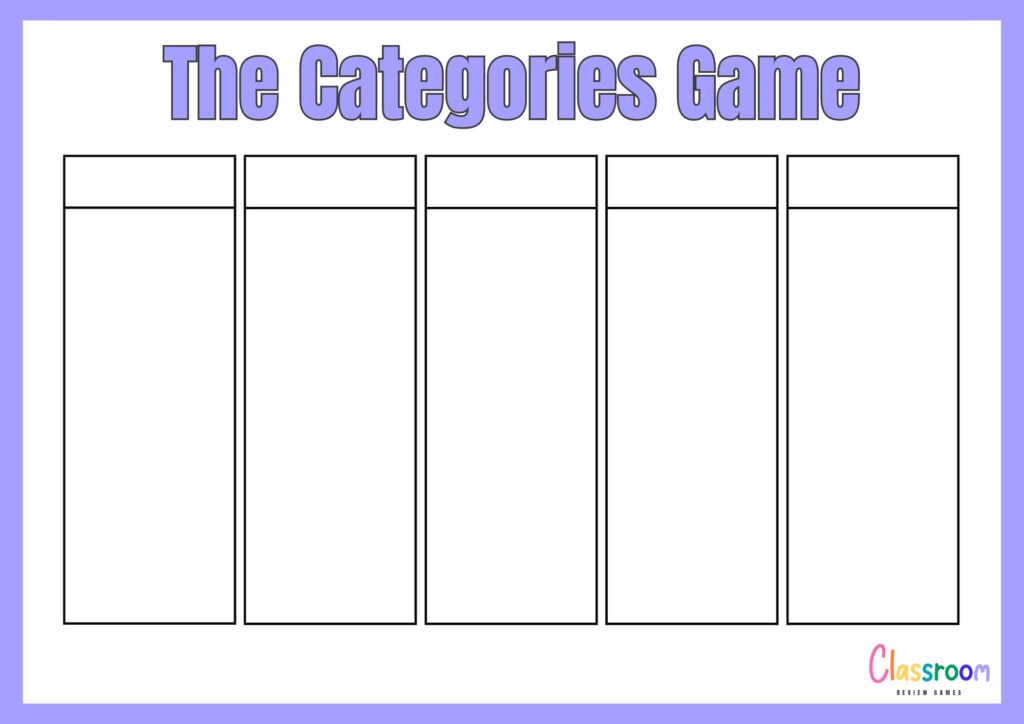
List of Categories for Games
Have a list of categories for the game ready. You can make you own list or print this game categories for free.
Divide the Class into Teams
Split your students into 2 or 3 teams based on your class size. For smaller classes, you can have students play individually instead of in teams.
Choose Categories
Decide on 4, 5 or 6 categories for the game. Pick a few different categories for the game. Write each category as a heading on the board. To help with choosing categories, hand out the free Categories Sheet to each team or individual.
Select a Letter
Pick a letter from the alphabet to start the first round of the game. For example, you might choose the letter “B.”
Start the Game
Each team (or individual) should write down one word for each category that begins with the letter you chose. For instance, if the categories are Animals, Food, and Countries, and the letter is “B,” they might write “Bear” for Animals, “Banana” for Food, and “Brazil” for Countries.
Teams can write their answers on paper or use the provided categories worksheet.
End the Round
The first team to complete their list should clap twice and put their hands on their heads. All other teams must stop writing immediately when they see this signal.
Check Answers and Award Points
Review the answers of the first team to ensure they are correct. If all their answers are correct, award them 5 points. Then check the answers from the other teams. Give 1 point for each correct answer they provided.
Play Additional Rounds
Start a new round with a different letter of the alphabet. You can also change the categories if you wish. Continue playing until you’ve had enough rounds or time.
Integrating into Different Subjects
English/Language Arts: Use this game to review vocabulary words, parts of speech, or literary terms.
Math: Create categories like “Geometric Shapes,” “Even Numbers,” or “Math Operations.” It’s a great way to get students thinking mathematically in a creative way.
Science: You can use categories such as “Elements on the Periodic Table,” “Types of Rocks,” or “Parts of a Cell” to reinforce scientific concepts.
History/Social Studies: Categories like “Famous Explorers,” “US Presidents,” or “Countries in Asia” help students review historical facts and geography.
Foreign Language: This is an excellent vocabulary-building tool. You can ask students to list words in the target language for categories like “Food,” “Clothing,” or “Places in a City.”
List of Categories
The categories below are relevant to what my students learn at school and can be easily integrated into lessons as review or reinforcement activities.
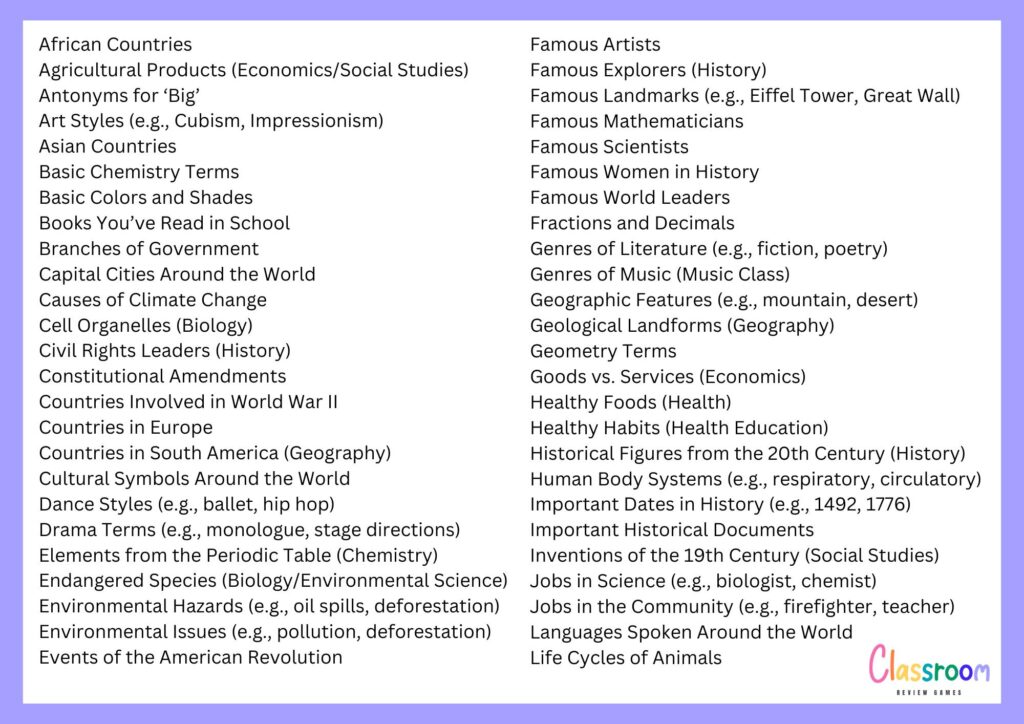
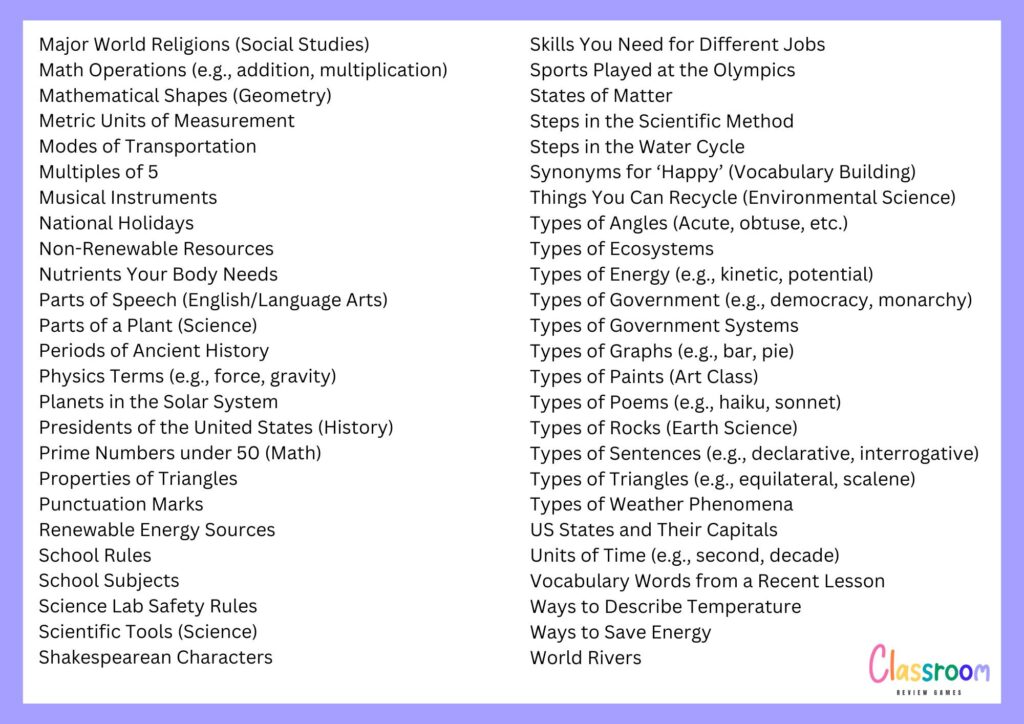
Here is a list of 100 categories for the category game you can use in your classroom:
- African Countries
- Agricultural Products (Economics/Social Studies)
- Antonyms for ‘Big’
- Art Styles (e.g., Cubism, Impressionism)
- Asian Countries
- Basic Chemistry Terms
- Basic Colors and Shades
- Books You’ve Read in School
- Branches of Government
- Capital Cities Around the World
- Causes of Climate Change
- Cell Organelles (Biology)
- Civil Rights Leaders (History)
- Constitutional Amendments
- Countries Involved in World War II
- Countries in Europe
- Countries in South America (Geography)
- Cultural Symbols Around the World
- Dance Styles (e.g., ballet, hip hop)
- Drama Terms (e.g., monologue, stage directions)
- Elements from the Periodic Table (Chemistry)
- Endangered Species (Biology/Environmental Science)
- Environmental Hazards (e.g., oil spills, deforestation)
- Environmental Issues (e.g., pollution, deforestation)
- Events of the American Revolution
- Famous Artists
- Famous Explorers (History)
- Famous Landmarks (e.g., Eiffel Tower, Great Wall)
- Famous Mathematicians
- Famous Scientists
- Famous Women in History
- Famous World Leaders
- Fractions and Decimals
- Genres of Literature (e.g., fiction, poetry)
- Genres of Music (Music Class)
- Geographic Features (e.g., mountain, desert)
- Geological Landforms (Geography)
- Geometry Terms
- Goods vs. Services (Economics)
- Healthy Foods (Health)
- Healthy Habits (Health Education)
- Historical Figures from the 20th Century (History)
- Human Body Systems (e.g., respiratory, circulatory)
- Important Dates in History (e.g., 1492, 1776)
- Important Historical Documents (e.g., Declaration of Independence)
- Inventions of the 19th Century (Social Studies)
- Jobs in Science (e.g., biologist, chemist)
- Jobs in the Community (e.g., firefighter, teacher)
- Languages Spoken Around the World
- Life Cycles of Animals
- Major World Religions (Social Studies)
- Math Operations (e.g., addition, multiplication)
- Mathematical Shapes (Geometry)
- Metric Units of Measurement
- Modes of Transportation
- Multiples of 5
- Musical Instruments
- National Holidays
- Non-Renewable Resources
- Nutrients Your Body Needs
- Parts of Speech (English/Language Arts)
- Parts of a Plant (Science)
- Periods of Ancient History
- Physics Terms (e.g., force, gravity)
- Planets in the Solar System
- Presidents of the United States (History)
- Prime Numbers under 50 (Math)
- Properties of Triangles
- Punctuation Marks
- Renewable Energy Sources
- School Rules
- School Subjects
- Science Lab Safety Rules
- Scientific Tools (Science)
- Shakespearean Characters
- Skills You Need for Different Jobs
- Sports Played at the Olympics
- States of Matter
- Steps in the Scientific Method
- Steps in the Water Cycle
- Synonyms for ‘Happy’ (Vocabulary Building)
- Things You Can Recycle (Environmental Science)
- Types of Angles (Acute, obtuse, etc.)
- Types of Ecosystems
- Types of Energy (e.g., kinetic, potential)
- Types of Government (e.g., democracy, monarchy)
- Types of Government Systems
- Types of Graphs (e.g., bar, pie)
- Types of Paints (Art Class)
- Types of Poems (e.g., haiku, sonnet)
- Types of Rocks (Earth Science)
- Types of Sentences (e.g., declarative, interrogative)
- Types of Triangles (e.g., equilateral, scalene)
- Types of Weather Phenomena
- US States and Their Capitals
- Units of Time (e.g., second, decade)
- Vocabulary Words from a Recent Lesson
- Ways to Describe Temperature
- Ways to Save Energy
- World Rivers
The Categories Game Is a Good Review and Test Prep Game
The Categories Game is an excellent low prep review game because it reinforces learning in a fun and interactive way. Here’s why it works so well for review:
Test Vocabulary
Students must recall and use specific words related to what they’ve learned in class. This active retrieval helps solidify their understanding and retention of key vocabulary and concepts.
Boost Quick Thinking
The game challenges students to think on their feet and come up with appropriate words for each category. This fast-paced recall reinforces their ability to access and apply knowledge quickly, which is great preparation for tests.
Promote Teamwork
When played in groups, students work together to remember and discuss concepts. This collaborative effort enhances peer learning as they help each other recall information and discuss their answers.
Flexible and Engaging
The Categories Game can be adapted to any subject or grade level, making it a versatile tool for review. Its engaging nature keeps students interested and motivated, turning review sessions into a fun activity.
Games Similar to the Categories Game
If your students love the Categories Game, here are some other games they might enjoy:
Scattergories: A classic game where players come up with answers that fit into specific categories starting with a chosen letter.
Taboo: In this game, players try to get their teammates to guess a word without using certain “taboo” words.
Pictionary: Players draw images that represent words or phrases, and teammates guess what it is.
Charades: Similar to Pictionary, but instead of drawing, players act out the word or phrase.
Bananagrams: A fast-paced word game where players create a grid of words using letter tiles.
